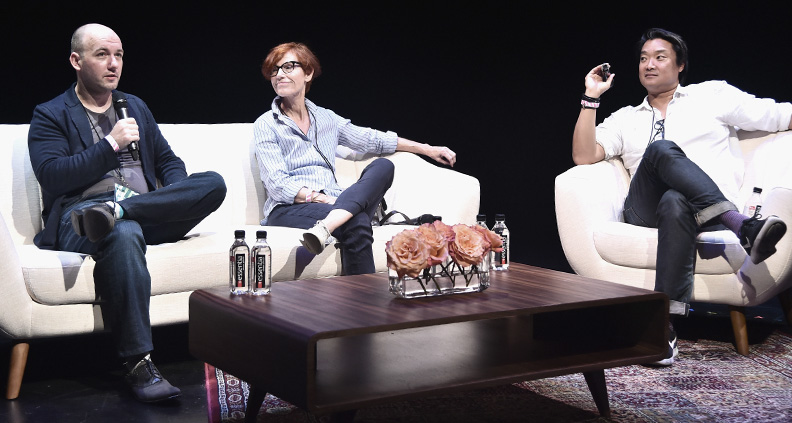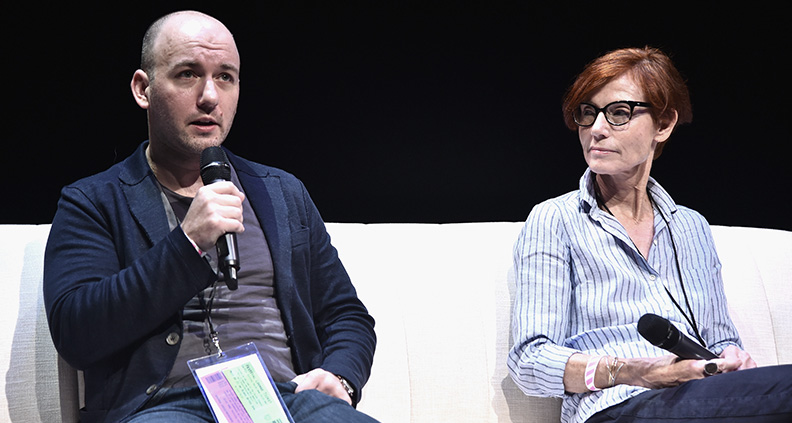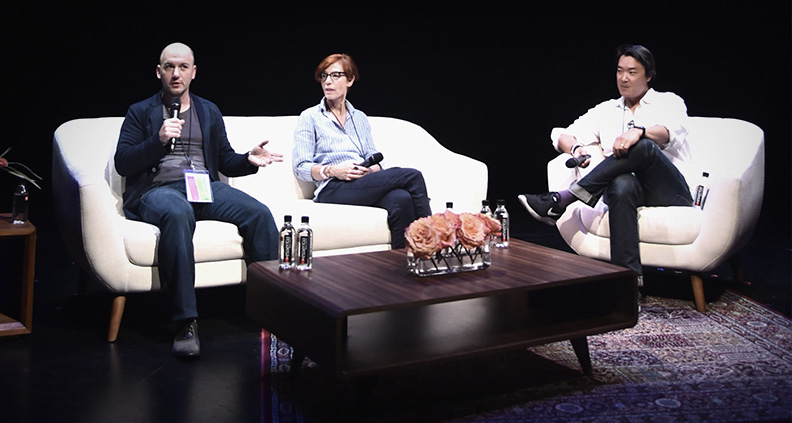At the Kirk Douglas Theatre on Sunday June 18, writer/producer Doug Jung (Star Trek Beyond) took the stage to double as panelist and moderator, joined by writer/producer/actor Simon Barrett (V/H/S, You’re Next) and screenwriter/novelist Linda Woolverton (Maleficent, The Lion King, 1991’s Beauty and the Beast).
HUMBLE BEGINNINGS
The panel began in reverse, with the audience first listing their questions for the panelists to use as a jumping-off point for discussion. One of the most burning questions people asked was about the personal journey each of the panelists took toward reaching career success. As Jung pointed out, no two career paths are identical. Jung, for example, described his own journey as somewhat traditional. He went to film school in New York, moved to LA and began taking PA jobs, steadily working his way up the food chain. Simon recounted his rocky path from making 16mm films as a Midwestern teen to meeting collaborators in college and producing his first feature while working as a licensed private investigator—a license he still renews annually, he said. “We are very different people,” observed Woolverton, before recounting her journey from publishing YA novels and writing for Saturday morning cartoons to becoming the first woman to write an animated feature, with Disney’s Beauty and the Beast in 1991.
THE IMPULSE TO MEANINGFUL STORYTELLING
But despite their respective backgrounds, the panelists agreed that what ultimately pushed them forward was the desire to share a certain truth about humanity that they felt was their duty to tell. Woolverton talked about her desire to change the idea of the “victim princess” at Disney—her goal being to “push the culture forward in some way” with her work. On the other hand (and perhaps with a slightly less altruistic approach) Barrett spoke about the struggle to make a profoundly thematic independent genre film while still trying to make a living. Although, he said, his scripts always have social commentary for those who seek it. “If your film doesn’t have a subtext or something to say, then is it worth making?” he said.
DIVERSITY VS. TOKENISM
The conversation took its natural course to the issue of diversity—something Jung says he wrestles with as a writer of color. “Diversity,” he said, “has become a ‘thing’. Almost like a selling point.” In other words: good storytelling is sometimes sacrificed by trying to jump on the bandwagon. Woolverton illustrated this point by explaining an experience she had working on 2014’s Maleficent, a film set in Northern Ireland and Scotland. When asked to make the film more diverse, Linda had to say “no” because, well… “There aren’t a lot of Asians in Ireland,” interjected Jung. Taking pains to not to come off as the white male with the answer to diversity, Barrett described his disdain for tokenism and pandering. He stated that it’s his hope that even if the process is slower than we’d all like, real progress means having diversity with integrity—something he said was inevitable, as it’s an accurate reflection of the world in which we all live. “It’s awkward and it’s growing pains and we’re all going to have these conversations, and everyone’s going to have different opinions,” he said, “but the debate itself has value.”
ARGHHH! WRITERS’ BLOCK!
On a lighter note, the panelists took turns sharing their tips for moving past writers’ block and being able to finish a script, even (and especially) when not feeling creative. Woolverton shared that whenever she gets lost, she always goes back to the theme of the script and tries to work from there. “If I get stuck I watch something that really inspires me,” she said, “something that reminds me why I wanted to be a writer at all.” As an interesting twist, Barrett joked that he does the opposite: watching bad movies to get his hopes up that if even those projects can get made, he can surely do better. Getting more serious, Barrett then shared that he always finds it best to work on multiple projects at once. That way if you hit a wall on one, you can go to the other—and, when you feel like you’ve made progress, you can use that momentum to go back to finish up the first project.
ADVICE ON IMPROV AND KEEPING YOUR HEAD UP
The panelists then went back to the audience for a final round of questions. Topics discussed included: the research process, how to apply script notes and, finally, how to deal with actors who like to improvise during heavy dialogue scenes. Woolverton’s experience is a bit different. She noted that animation is such a long and precise process that there really isn’t much leeway for ad-libs. On the other hand, Barrett—a veteran of the mumblecore genre, characterized by improvised performances—said that his experience working with actors is usually great. If there’s something the actor improvises that isn’t quite working, he’s fine giving them a note to stick to the script. The final question was advice on keeping one’s head up as a writer, despite all the adversity. Woolverton offered some sound advice: thanks to a crappy childhood, she said, she took it upon herself to “be the change” and try to uplift the culture in whatever way she could. “If I was able to get through my childhood and survive intact, then I could do anything,” she said.
The 2017 LA Film Festival took place June 14—22, headquartered at the ArcLight Cinemas Culver City, with additional screenings at ArcLight Hollywood, ArcLight Santa Monica, LACMA and The Theatre at Ace Hotel. Catch more of our coverage on the blog and our YouTube channel. Not a Member of Film Independent yet? Become one today.


